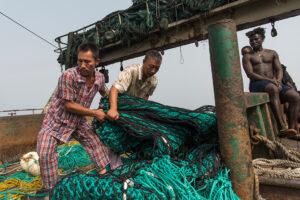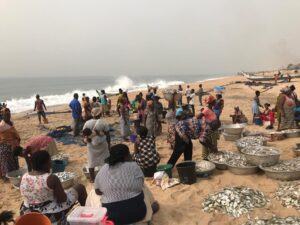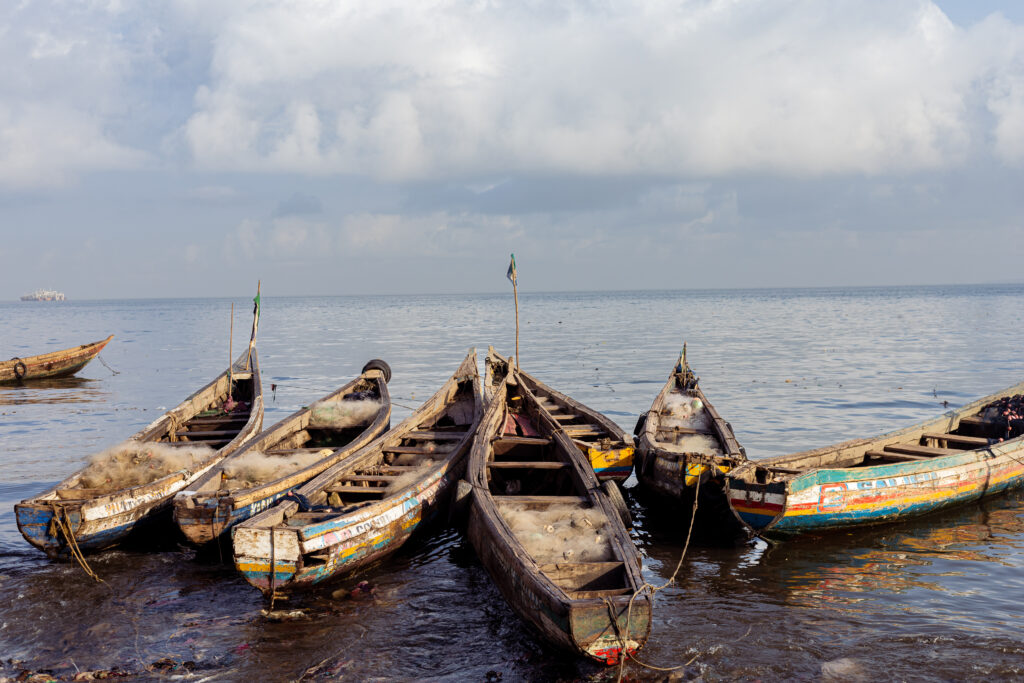Not so long ago, local fishermen heading out to sea were almost assured of a good catch as long as they knew their way around the waters that offered an abundance of all manner of fish. Of course, there were those very bad days when they would come back with nothing to show for their time and resources at sea. But those exceptionally bad days, every fisherman’s nightmare, has become the new normal for fisherman, Gibril Sesay and his colleagues around the country.
“Things have changed a lot these days and it is even possible that you can go for days and return without any fish”.
The 38-year-old, who lives at Moa Wharf in Freetown, told Engage Salone that to get a substantial catch today, they have to go beyond their usual fishing zones, costing them a lot more resources and time. “Getting fish today has become very expensive and difficult,” he told our reporter.
Lamenting the precariousness of the fishing business today, Sesay said what they catch nowadays cannot be compared to what they used to get 17 years ago when he became a fisherman.
“The fish we have in our waters these days can’t be compared to before. Getting fish has become very difficult and expensive. You need a lot of fuel and expensive fishing gear to be able to go where the fish are. If not, you won’t get any catch to come back and sell.”
This is certainly worrisome for fishermen like Sesay and others in the fisheries business which employs around 500,000 people in the country.
Sesay blamed their dwindling catch on “the presence of large Chinese and other foreign fishing trawlers” in Sierra Leonean waters, competing with local fishermen. He alleged that fishing trawlers destroy fish breeding areas and damage fishing gear belonging to local fishermen.

Fishermen in other parts of the country make similar claims against foreign fishing vessels, accusing them of fishing in local zones and hostile behaviour towards artisanal fishing crews in small wooden boats. Last year, a UK newspaper, the Guardian reported that it interviewed 12 fishermen, all of them blaming their dwindling catch on “sustained overfishing on an industrial scale”.
According to the China Dialogue, about 75% of the industrialised fishing fleet in Sierra Leone are Chinese. Green Peace estimates that most industrial fishing trawlers along the West African coast are from China, a country that sits at the top of the Illegal Unregulated and Unreported fishing index.
The head of the Sierra Leone Artisanal Fishermen’s Union, Thomas Turay agrees that industrial trawlers are contributing to the dwindling fish stock because of the scale of their activities and their methods of fishing. “They catch everything and destroy [fish] breeding grounds,” he told Engage Salone.
Turay also argues that local fishermen contribute to the problem too. He said some of the methods used by local fishermen were unsustainable.
“Some of them use methods like dynamite to fish, you end up destroying the ecosystem, including the area where the fish lay their eggs.”
Turay said decades ago, before the advent of motorised fishing boats, there was fish in abundance. He said the problem started when fishermen started using motorised boats that scared fish away.
“Our fellow fishermen see us as enemies because we criticise their fishing methods.”
Sierra Leone’s dwindling fish stock does not only affect fishermen. It trickles all the way down to the fish sellers in small markets and families who depend on fish for their daily protein.
Adama Samura and Fatu Sesay own fish stalls at Congo Market in Freetown where they retail. They both expressed concern over the shortage of fish and the increasing cost when fish is available.
“I spent the whole of last week going to King Jimmy [Wharf] but I could not get anything to come and sell,” she said. “Because fuel has become very expensive, the cost of fish has also gone up,” Fatu added.

For fisherman Gibril Sesay, the authorities need to enforce the law to rein in trawlers that make it hard for local fishermen to thrive at sea. His confidence in the system however is very shaky, citing corruption and bribery.
“We need to work with the law. The government should address this problem and pay attention to the bribery,” Sesay said.
The issue of corruption in the fisheries and marine resources sector has always been a major obstacle to addressing illegal fishing, especially by large vessels that are said to be using bad fishing methods that account for the rapidly decreasing fish stock. The founder and head of Environmental Justice Foundation [EFJ] which used to provide assistance to curb the practice, has in the past said inaction on the matter is related to corruption.
“All too often officials were turning their eyes the other way. I think it is a fairly reasonable assumption to say that those who should have been exercising their duties were either being told not to or did not want to – and that speaks to corruption.”
Fishermen’s Union President Thomas Turay argues that urgent action is required to address the widespread illegal and unregulated fishing that is taking place in Sierra Leonean waters.
“If nothing is done, there will come a time when we will have nothing left in our waters.”
The government says it has been taking measures to curb illegal and unregulated fishing in the country by investing in monitoring and surveillance and making policy reforms that would positively impact the fishing sector. In 2019, the government introduced what it called “close season”–a one-month ban on industrial fishing as well as the exportation of fish from Sierra Leone. The move was to allow for fish stock to replenish. Fishermen and conservationists applauded the decision but they say the impact of industrial fishing requires a lot more than a short ban.
Before Gibril Sesay headed out to sea to try his luck again, he called on the government to take action to save livelihoods today and the future of fishing in the country.
“We are calling on the government to enforce the law and pay attention to our marine resources because there is so much there and if we take care of it, the generations to come will benefit from it”.
About The Author
- Ishmael Sallieu Koromahttps://staging.engagesalone.org/author/ishmael-sallieu-koroma/
- Ishmael Sallieu Koromahttps://staging.engagesalone.org/author/ishmael-sallieu-koroma/
- Ishmael Sallieu Koromahttps://staging.engagesalone.org/author/ishmael-sallieu-koroma/


